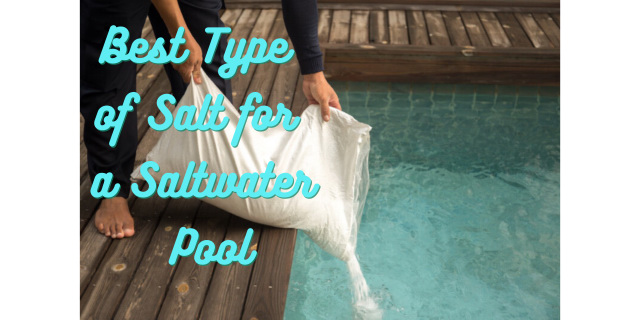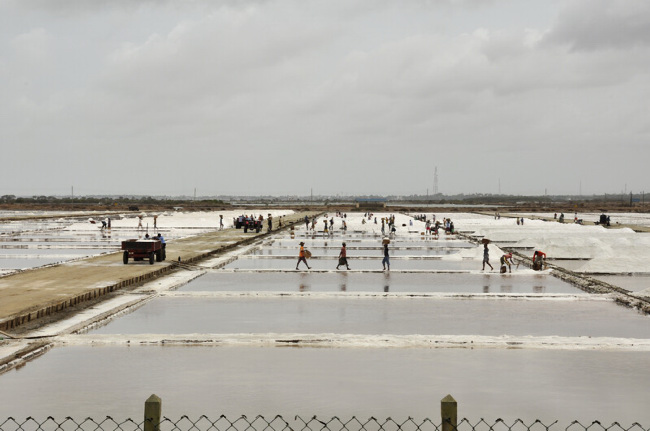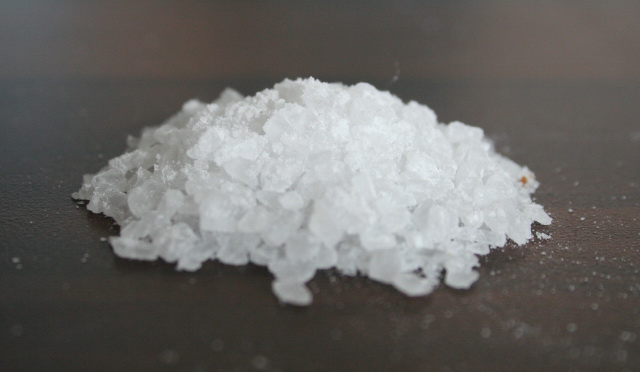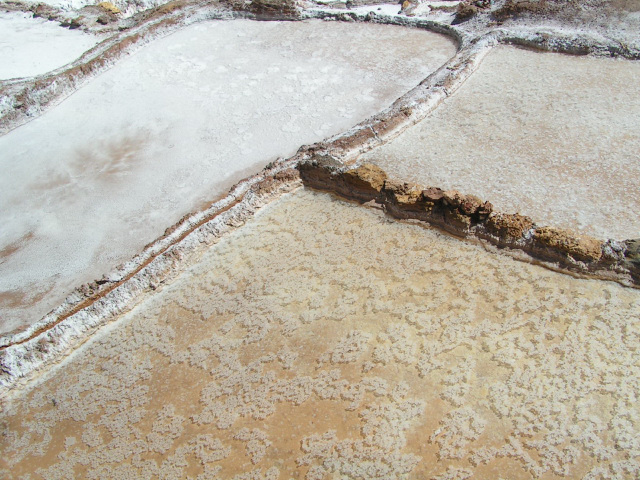Salt is the main thing you need to keep your saltwater pool safe and healthy. But what’s the best type of pool salt and how do you pick the right type of salt to use in your pool? The answers to these questions and more will be revealed in this article. So let’s dive in.

Article Contents
What are the Types of Pool Salt?
There are different types of salts out there ranging from table salt to flake salt and we’ll get to them later in this article but when it comes to pool salts, here are the 3 main types:
Mined Salt
Mined salt, also known as rock salt is a pool salt common for its high purity level. This salt contains between 95% and 99% sodium chloride making this salt pure and ideal for sanitizing saltwater pools. Also, rock salt comes in larger crystals than regular salt. This means that rock salt will last longer in the pool.
Mined salt comes from underground salt mines. The properties of the mine determine the concentration and features of the salt. Some salt mines have high levels of trace minerals and iron compounds that will be deposited in the salt.
Pros of Mined Salt
- Very pure form of pool salt
- The salt is natural making it healthy for pools
- Mined salt is cheap.
Cons of Mined Salt
- Due to the high concentration of sodium chloride, mined salt can cause corrosion in concrete pools.
- Some rock salts have trace mineral and iron deposits from the salt mines. In large quantities, the trace minerals (like iron and copper) can cause staining.

Solar Salt
Solar salt is made by drying saltwater. Really, that’s it. Saltwater or seawater is collected in large holding containers and placed under direct sunlight for days to dry. The purpose is to evaporate the water leaving only salt (or sodium chloride).
Making solar salt is a natural process. However, you should know that solar salt though is known to host millions of microscopic aquatic life, especially brine shrimp. After some time and due to the absence of water and exposure to heat, the brine shrimp will begin to decay, leaving them behind in the salt.
If you use solar salt directly, you’ll be adding the decayed matter to the pool water. The foundation of keeping a well-maintained pool is the removal of organic matter. So it doesn’t really make sense to use a salt full of organic matter.

Pros of Solar Salt
- Solar salt is very cheap
- The salt crystals are natural
- The chlorine from solar salt is effective
Cons of Solar Salt
- Solar salt contains organic contaminants
Mechanically Evaporated Salt
This salt is made by drying out seawater. Evaporated salt goes through a similar process as solar salt. Except that heat generators are used to mechanically dry out the salt. They are designed to dry seawater and leave only salt.
The use of machines to dry out the water also helps to remove organic contaminants. But in the process of drying the salt, mineral deposits are usually left behind. In large quantities, these minerals can cause scaling.
Pros of Evaporated Salt
- The salt is effective
- It dissolves easily in pool water
- The salt crystals are pure
Cons of Evaporated Salt
- Evaporated salt is expensive
- Evaporated salt may increase mineral deposits in pool
- Can cause staining
What Pool Salt Should You Use in Pool?
It’s always best to make sure you use a salt that is specifically for swimming pools. This will minimize the chance of unwanted organic contaminants, minerals and metals in the salt.
It’s generally advised to use pure salt with at least 95% purity or sodium chloride in saltwater pools. This is because with pool salt, the higher the purity of the salt, the fewer contaminants or other water balance issues you’ll have. Which means a cleaner pool with reduced maintenance.
- Always use >95% purity salt
- Use salt for swimming pools
- Don’t use cooking salts
- Higher purity salt minimizes water problems
Another benefit of using a cleaner pool salt is you’ll maximize the life of the salt cell. The more contaminants in the water, the harder the chlorine generator and salt cell will need to work.
Now, let’s check out the top 5 pool salts below.
Related Reading: How Much Pool Salt to Add to Pool?
5 Quality Pool Salt Options
Here are the top 5 brands of pool salts in no particular order:
1. Aquasalt Pool Salt
- High purity salt for saltwater chlorine systems
- Dissolves quickly when distributed over a large water surface
- For pools & spas
The Aquasalt swimming pool salt is a top choice for many pool owners. One reason for this is that the salt has a high level of purity and as explained earlier, the higher the purity of the pool salt, the more effective it will be at sanitizing the pool water. Aquasalt also dissolves quickly in water. The 40-pound Aquasalt pool salt usually goes for under $25.
2. Clean & Pure Pool Salt
- High quality pure salt for pools & spas
- Gentler on the eyes, skin, & hair
- Quick dissolving crystals
Clean & Pure Pool Salt is another top choice for pool owners since it has a high level of purity. Like any pool salt, Clean & Pure Pool Salt can be used alongside pool chlorine.
3. Mortons Pool Salt
Mortons pool salt is a highly effective swimming pool salt. Like other top pool salts, Mortons pool salt has a high purity level. The pool salt also has a natural formula and it dissolves quickly in water. The natural formula of the Mortons pool salt means that it doesn’t irritate the skin or cause stinging in the eyes. The 40-pound Mortons pool salt costs about $30.
4. The Kissner Pool Salt
Kissner pool salt also known as the Kissner clean and pure pool salt is an effective pool salt known to create very soft chlorine that doesn’t irritate or etch pool equipment. The pool salt also improves overall pool experience as the pool salt creates softer water. The main reason for this is that Kissner pool salt doesn’t contain any hazardous ingredients.
5. Diamond Crystal Pool Salt
- No additional additives
- Fast dissolving
- Protects against skin irritation
Diamond crystal pool salt is not commonly-used among pool owners because the pool salt is costly. The Diamond crystal 8526 pool salt for instance costs more than $55 (more than twice the cost of a 40-pound Aquasalt pool salt. One reason for this high cost is that Diamond crystal pool salt dissolves very quickly.
Now that you know the top types of pool salt, let’s check out how pool salt is made.
How is Pool Salt Made?
Pool salt is made either through the mining, evaporation, drying, or heating of a natural matter. All types of salt including pool salt are made from natural matter, usually seawater or salt rocks (from salt mines).
Making pool salt is a very similar process to making cooking salt. This is where pool salt differs from other types of salt.
With other types, the salt is usually made into smaller sizes and often has additives. For instance, table salt is usually iodized (mixed with iodine) to give additional health-related benefits. Pool salt doesn’t go through such processes because the salt has to be at least 95% pure for effective sanitization.
The other key difference between pool salt and other salts, such as rock, cooking, table, sea salt or kosher salt is the size of the crystals. Swimming pool salt is usually made into larger crystals. Whereas cooking salt is broken down into smaller-sized crystals.
So now you know that pool salt is similar to cooking salt and other types of salt. But can you use other types of salt in the pool?
Let’s check that out.
Can You Use Table Salt in Pool?
You shouldn’t use table salt in a saltwater pool. Regular table salt often contains iodine and this makes the salt bad for pools. Pool salt has to be between 95% and 100% pure.
If you’re still not convinced, table salt is smaller than pool salt. Table salt has small crystals so it can dissolve quickly in food while pool salt has much larger crystals making it better suited to pools.
Can You Use Rock Salt in Pool?
You can use rock salt in pools. Rock salt is known to have a very high purity level which makes it ideal for sanitizing swimming pools. Rock salt also comes in large crystals which makes it last longer in the pool.
However, you should always check the mineral content of the rock salt before putting it in your pool water. This is because rock salt sometimes contains minerals and metal ions gotten from the salt mines. If the rock salt is less than 95% pure, you shouldn’t use it in the pool.

Can You Use Flake Salt in Pool?
You shouldn’t use flake salt in a saltwater pool. Flake salt is similar to many other cooking salts. The key difference between cooking salts and pool salt is the purity and the size of the flakes.
It’s desirable to have the highest purity of salt in a swimming pool. The fewer minerals, metals, chemicals and other organics that are introduced into your swimming pool, the better.
Related Reading: White Flakes in Saltwater Pool and How to Remove Them
Can You Use Sea Salt in Pool?
You shouldn’t use sea salt directly in the pool. This is because sea salt is known to host several microscopic aquatic life ranging from tiny seaweed to brine shrimp. Using sea salt directly in your pool will make way for bacteria and algae.
Sea salt is usually made from solar evaporation or mechanical evaporation methods. Solar evaporation can leave organic contaminants in the salt whilst mechanical techniques can leave unwanted and minerals and metals.
Your best bet is to use a salt specifically made for swimming pools. This is usually a mined salt.

Can You Use Iodized Salt in Pool?
You shouldn’t use iodized salt in salt pools because iodized salt contains iodine and this makes it bad for pools. Salt enriched with iodine was to help with thyroid health. It was started in since 1924.
What’s this got to do with saltwater swimming pools? Nothing! And that’s the way it should be. Your pool doesn’t need iodine as the human body does.
So in summary, the only salt you should use in your pool is pool salt or pure sodium chloride. Other types of salt are usually made for reasons asides from sanitizing the pool water. But is pool salt only used for sanitizing pools? What are the other uses of pool salt? Let’s find out.
What are the Other Uses of Pool Salt?
1. For Absorbing smells
Pool salt given the larger nature of the crystals will help to absorb odors in tight spaces and corners. You can even sprinkle some pool salt in your sneakers after your workout routine to absorb the smell of sweaty feet.
2. For Preserving Food Items
Some swimming pool salts are also food grade. Salt is still used in many foods to preserve and create unique flavors. Such as salt-cod, preserved lemons, Jamón, prosciutto and other preserved foods.
3. For Cleaning
Pool salt can also be used to clean household items. You can also remove filth and scum from surfaces by rubbing the salt against the surface.
4. For Curbing Weed Growth
A common practice to stop weeds and other organic matter from growing in your yard, window area, patios, and walkways is to sprinkle pool salt on these areas. The gradual deterioration of the salt increases the acidic level of these areas making it impossible for weeds and other organisms like earthworms to thrive.
5. For Soothing Insect Bites and Stings
No one wants to get stung or bitten by an insect but in the event of a bite or sting, you can use pool salt and warm water to soothe the bite or sting. You should still seek medical attention as pool salt isn’t a cure in the event of a venomous insect bite or sting.
Pro Tips To Remember When Buying Pool Salt
- Pick salt that has high purity level (95% to 100%)
- Consider the price tag
- Buy in bulk to save
- Pick salt that can be dissolved easily
- Don’t use salt that has caking additives.
Final Words
Overall, the best salt to use in your pool is pure sodium chloride. If the salt contains minerals, it will either interfere with chlorine production or cause staining or scaling in the pool. When choosing a salt that is meant for swimming pools.
So there you have it. If you liked this post, ensure to check out others like it on this website for more pool tips.
Related Reading: Beginners Guide to Saltwater Pool Maintenance




